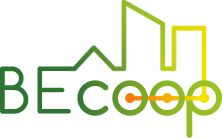BECoop aims at putting communities in charge of their local renewable (bio)energy generation: but what are communities?
Energy communities, also referred to as Citizens Energy Communities (CECs) are voluntary and open groups of neighbouring individuals cooperating with, as primary purpose, to provide environmental, economic or social community benefits to its members rather than to generate financial profits.
CECs are recognized in the Clean Energy Package, as a key enabler to encourage the involvement of individuals in the electricity and heating sectors.
They may engage in the generation, distribution, supply, consumption, aggregation, energy storage, energy efficiency services or charging services for electric vehicles or provide other energy services to their members or shareholders. Most often, the energy will come from renewable sources.
Communities include cooperatives, eco-villages, small-scale heating organisations and other projects led by citizen groups (JRC, 2020). Therefore, an energy community is not always a cooperative – BECoop will kick off by working on project definitions that will soon be available here.
There are over 3500 communities in Europe (REScoop MECISE, 2019). Germany, Denmark, the Netherlands and UK are EU’s frontrunners in terms of number of communities registered.
Why join /produce energy in communities?
Going from a single household producing energy (“prosuming”) to a community is done for environmental and sustainability reasons, the desire to produce green electricity through local energy infrastructures, and a last driver is renewable peer to peer trading (PROSEU, 2020).
Communities and bioenergy
Communities producing heat through bioenergy are still scarce, barriers for the uptake of bioenergy technologies in the community energy field include the anticipated cost for establishing a bioenergy project, required project development effort and time, technical/business difficulties and limited awareness (benefits unknown). BECoop will strive to make all these barriers fall, empowering energy consumers to make informed decisions and become active prosumers acting as crowdsourcers and crowdfunders of the energy transition, ensuring transparent, safe and secure access to community energy and energy justice.
BECoop envisions a strong decentralised market with active energy communities, decreased costs of bioenergy heating technologies and continuously increasing numbers of active consumers.
